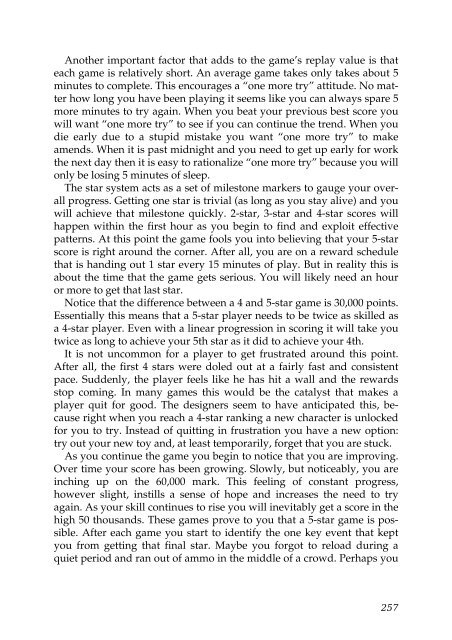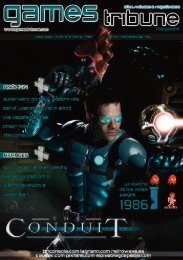Well Played 2.0: Video Games, Value and Meaning - OpenLibra
Well Played 2.0: Video Games, Value and Meaning - OpenLibra
Well Played 2.0: Video Games, Value and Meaning - OpenLibra
Create successful ePaper yourself
Turn your PDF publications into a flip-book with our unique Google optimized e-Paper software.
Another important factor that adds to the game’s replay value is that<br />
each game is relatively short. An average game takes only takes about 5<br />
minutes to complete. This encourages a “one more try” attitude. No matter<br />
how long you have been playing it seems like you can always spare 5<br />
more minutes to try again. When you beat your previous best score you<br />
will want “one more try” to see if you can continue the trend. When you<br />
die early due to a stupid mistake you want “one more try” to make<br />
amends. When it is past midnight <strong>and</strong> you need to get up early for work<br />
the next day then it is easy to rationalize “one more try” because you will<br />
only be losing 5 minutes of sleep.<br />
The star system acts as a set of milestone markers to gauge your overall<br />
progress. Getting one star is trivial (as long as you stay alive) <strong>and</strong> you<br />
will achieve that milestone quickly. 2-star, 3-star <strong>and</strong> 4-star scores will<br />
happen within the first hour as you begin to find <strong>and</strong> exploit effective<br />
patterns. At this point the game fools you into believing that your 5-star<br />
score is right around the corner. After all, you are on a reward schedule<br />
that is h<strong>and</strong>ing out 1 star every 15 minutes of play. But in reality this is<br />
about the time that the game gets serious. You will likely need an hour<br />
or more to get that last star.<br />
Notice that the difference between a 4 <strong>and</strong> 5-star game is 30,000 points.<br />
Essentially this means that a 5-star player needs to be twice as skilled as<br />
a 4-star player. Even with a linear progression in scoring it will take you<br />
twice as long to achieve your 5th star as it did to achieve your 4th.<br />
It is not uncommon for a player to get frustrated around this point.<br />
After all, the first 4 stars were doled out at a fairly fast <strong>and</strong> consistent<br />
pace. Suddenly, the player feels like he has hit a wall <strong>and</strong> the rewards<br />
stop coming. In many games this would be the catalyst that makes a<br />
player quit for good. The designers seem to have anticipated this, because<br />
right when you reach a 4-star ranking a new character is unlocked<br />
for you to try. Instead of quitting in frustration you have a new option:<br />
try out your new toy <strong>and</strong>, at least temporarily, forget that you are stuck.<br />
As you continue the game you begin to notice that you are improving.<br />
Over time your score has been growing. Slowly, but noticeably, you are<br />
inching up on the 60,000 mark. This feeling of constant progress,<br />
however slight, instills a sense of hope <strong>and</strong> increases the need to try<br />
again. As your skill continues to rise you will inevitably get a score in the<br />
high 50 thous<strong>and</strong>s. These games prove to you that a 5-star game is possible.<br />
After each game you start to identify the one key event that kept<br />
you from getting that final star. Maybe you forgot to reload during a<br />
quiet period <strong>and</strong> ran out of ammo in the middle of a crowd. Perhaps you<br />
257

















